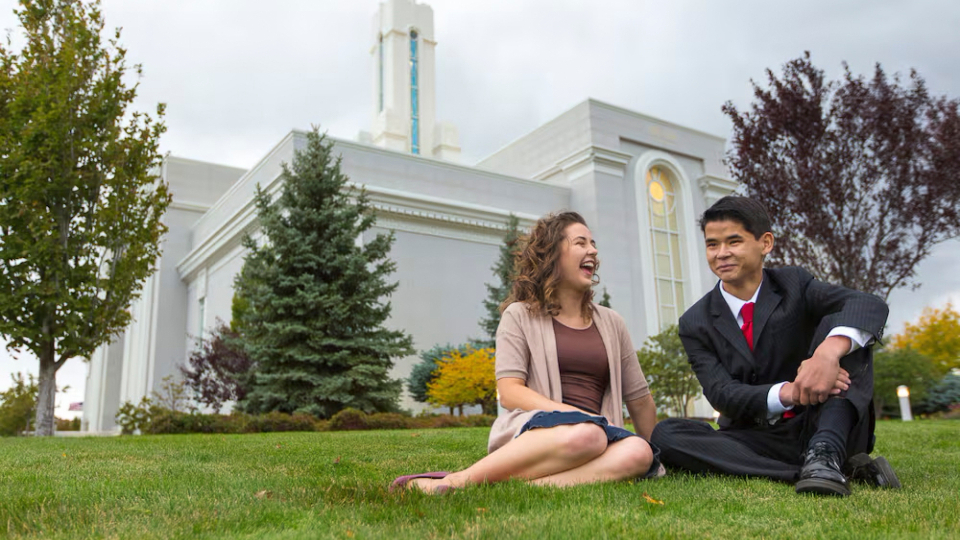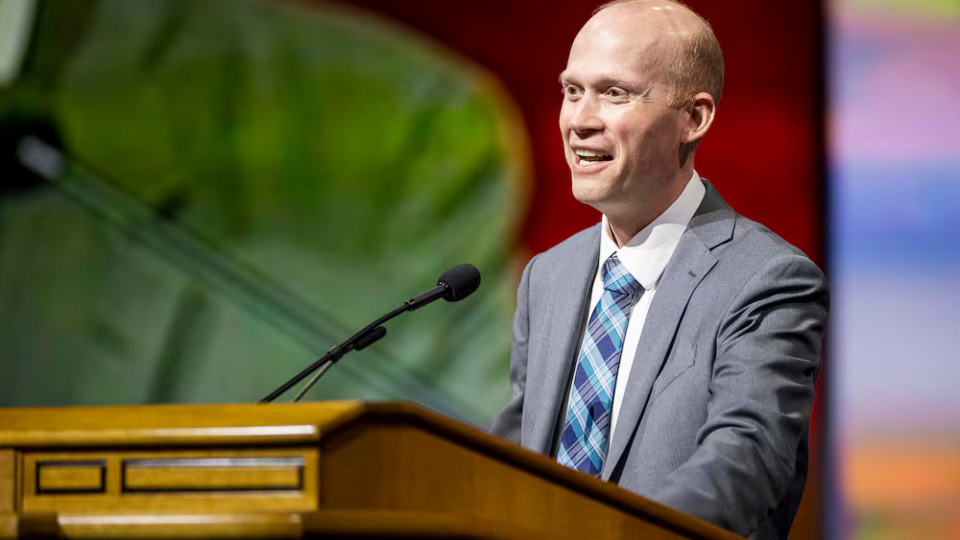
youth-temple
Youth sit on the grounds of the Mount Timpanogos Utah Temple. 2024 by Intellectual Reserve, Inc. All rights reserved.This story appears here courtesy of TheChurchNews.com. It is not for use by other media.
By Aimee Cobabe, Church News
To better understand questions related to how religion impacts mental health — particularly for Latter-day Saint teens and young adults — Justin Dyer, a professor at BYU, set up a yearslong study.
Dyer teaches religious education at Brigham Young University as well as graduate statistics. He currently researches how religion, family and mental health influence each other.
Dyer used data from a survey which followed over 1,000 Latter-day Saints and youth and young adults of other religions between the ages of 12 to 20 in Arizona and Utah starting in 2016.
He found that temple attendance was correlated with better mental health, including lower levels of depression and anxiety.
Temple attendance at age 16 was related to reduced depression at age 18. Youth with character traits such as honesty and humility increased their temple attendance between ages 14 and 16, according to Dyer’s research.
Dyer said other researchers, like Tyler VanderWeele at Harvard, have estimated that nearly 40% of the increase in the suicide rate could be attributed to the decrease in church attendance.
“We’ve decreased substantially in religiosity in society, while at the same time, mental health problems, suicide rates have greatly increased,” Dyer told the Church News podcast.

Youth-Temple
Justin Dyer, a professor in religious education at Brigham Young University, gives a campus devotional in the Marriott Center in Provo, Utah, on May 23, 2023. Photo by Garrison, BYU, courtesy of Church News.All rights reserved.Dyer also said that the temple’s purpose can be beneficial for one’s mental health.
“The purpose of being in the temple is to help to build eternal families and to gather Israel on both sides of the veil and to worship the Lord,” Dyer said. “That is so critical that we remember that in all of these details, we don’t get that overall purpose of the temple lost.”
He also said the temple is a great place to serve others and follow what Alma says at the waters of Mormon to bear one another’s burdens, mourn with those that mourn and comfort those that stand in need of comfort (see Mosiah 18).
“Getting outside of oneself is a wonderful help to our mental health,” Dyer said. “That’s one of the reasons why religion, we find, is so good for people, is those connections with other individuals, that reaching out and being reached out to is something that’s so critical in religion.”
The temple is a place where that selfless service can happen at a very personal, special level, according to Dyer.
“Being able to step back and serve other people, that is a beautiful, beautiful thing and helps us to walk the pathway of healing,” Dyer said.
But, Dyer warned against viewing temple worship as a box to check in order to cure mental illness.
“What we’re finding is … there are some wonderful things that may be an outcome of temple attendance, but it’s certainly not going to be the outcome for every single person,” Dyer said.
He related the mental health benefit to that gained from exercise.
“Exercise is really good for mental health, but if somebody says, ‘I’m going to exercise, and my depression is going to disappear,’ certainly exercising will be a good thing for that individual, on a lot of levels, but not necessarily … going to automatically make the depression disappear.”
In his research paper, Dyer quotes President Russell M. Nelson and his teachings on the temple.
President Nelson said in April 2024 general conference: “The temple is the gateway to the greatest blessings God has in store for each of us,” and he encouraged Latter-day Saints to worship in the temple “as regularly as your circumstances permit” (“Rejoice in the Gift of Priesthood Keys,” April 2024 general conference).
Temple Attendance and Church Activity
Temple attendance also correlated with long-term activity in the Church.
“If they’re doing that early on, they’re more likely to stay a member of the Church, they’re more likely to attend church, they’re more likely to be endowed,” Dyer said.

youth-temple
A group of young men attends the temple together. 2024 by Intellectual Reserve, Inc. All rights reserved.When looking deeper into why temple attendance impacts whether someone stayed in the Church, Dyer points to beliefs in the Restoration, the Book of Mormon and modern-day prophets.
Dyer’s research also found that young men and young women who study their scriptures in their early teen years are more likely to increase their temple attendance in their later teen years.
Scripture study was the strongest predictor of being endowed, according to Dyer’s research. Fifty-five percent of daily scripture readers were endowed compared to 11% of those who had not read scriptures in the past year.
“Personal scripture study doesn’t predict it really well at the younger ages — that’s where family makes most of the difference — but if the family can help to instill that scripture study [it] then seems to make an impact later on,” Dyer said.
“So none of these is a silver bullet, of course, right? And yet, what it does is it provides the very best ground for the seed to flourish,” he said.
Copyright 2024 Deseret News Publishing Company.
